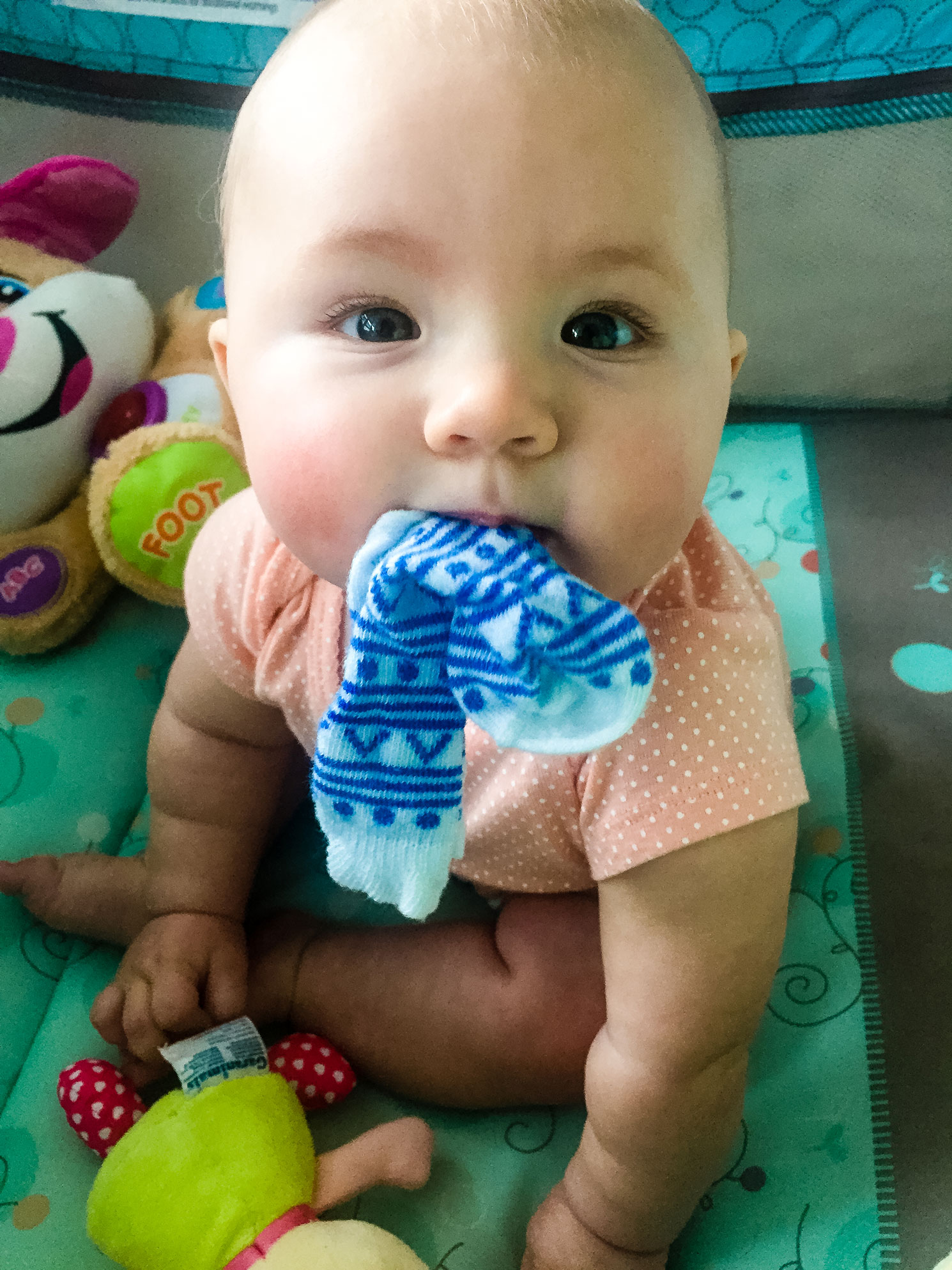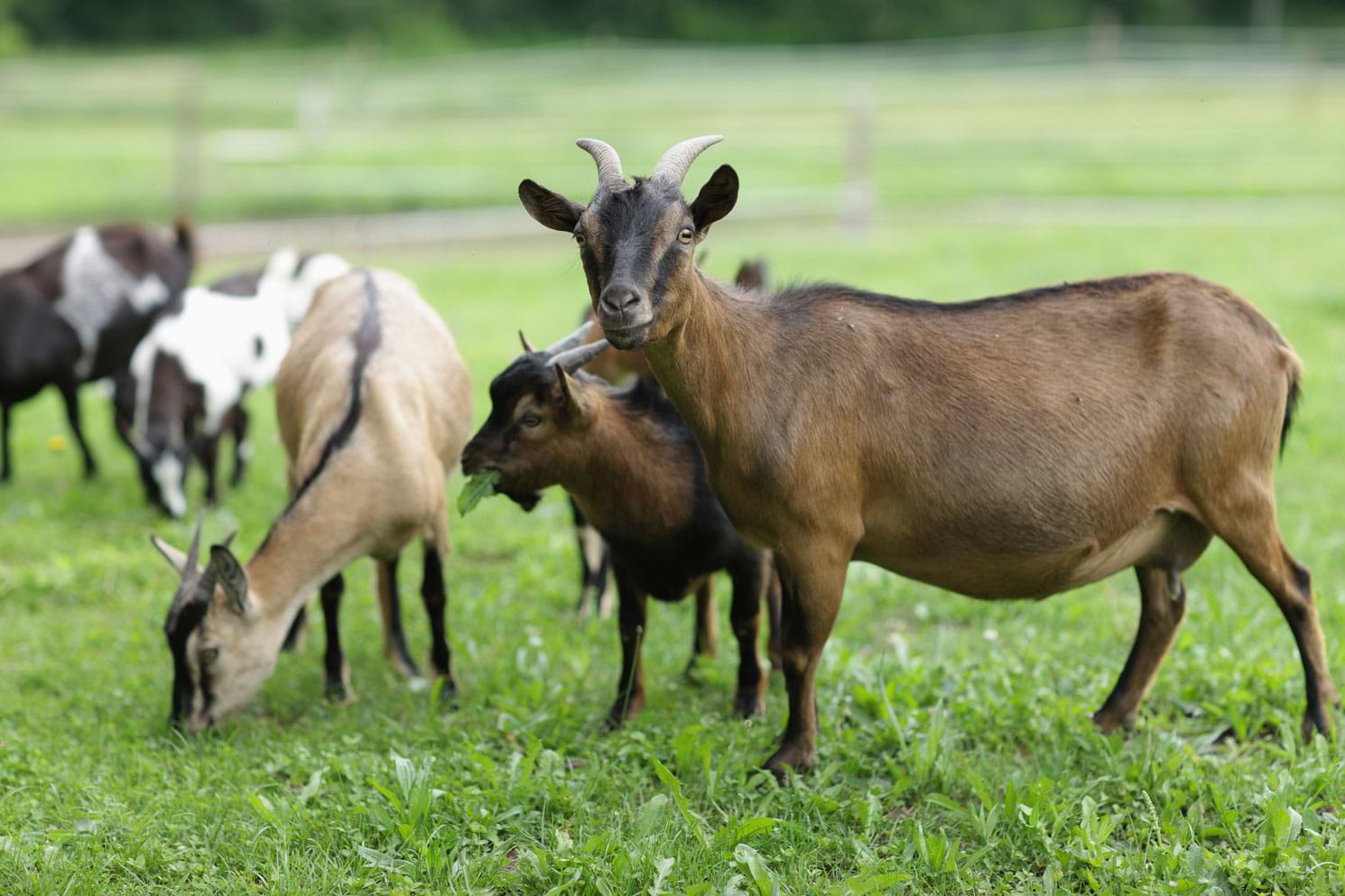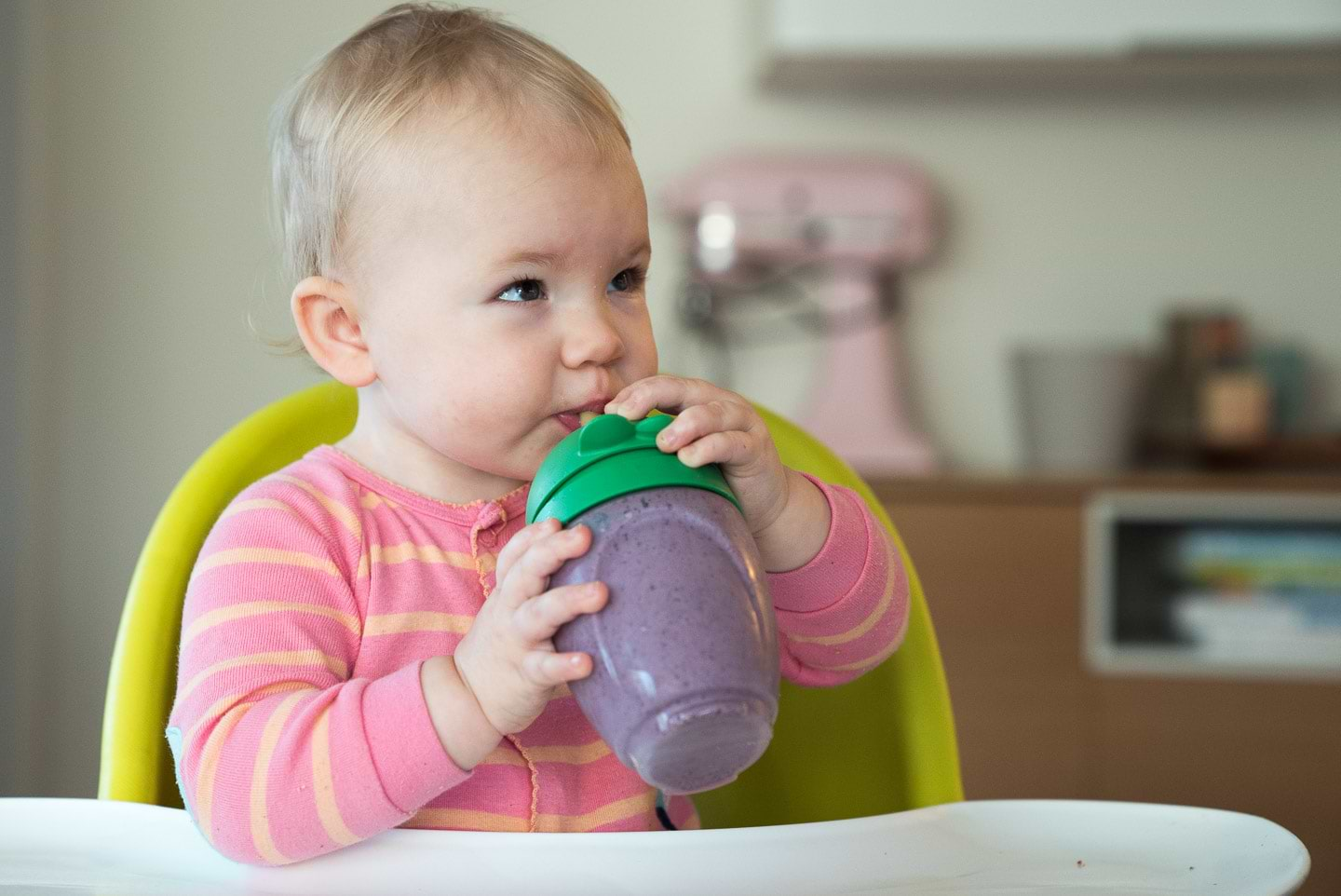Welcome to thoughtful, organic beauty
Hello Joyous is an organic, plant-based, sustainable beauty brand here to bring more joy to your day.
I get a lot of questions through social media on being a mama. So today I am going to share my answers to the most frequented asked questions about food, nursing and sleeping.
Keep in mind there are many different opinions on the best way to do things. I'm sharing my own experiences as a mama based on what's worked for us as a family.
I strongly encourage you to do your own research and have an open dialogue with your health-care practitioner and most importantly, trust your gut! I have been advised many things that I didn't agree with like introducing rice cereal as Vienna's first food. Does this mean if you gave your babe rice cereal they will suffer life-long consequences? Absolutely not. So please don't stress!
Here we go!
Question 1: Do you recommend Baby Led Weaning (BLW)?
My answer: I tried BLW with Vienna and I found the gagging too much for me to take! It didn’t feel right for us. I did my homework, did all the reading, watched extensive videos on how to do it effectively, learned all the benefits but at the end of the day, it didn’t work for us.
Instead, I started Vienna on purees and gradually just made them chunkier and then moved to finger foods. It was a very organic process. I didn’t just decide one day, okay now you only get finger foods. I let Vienna lead the way based on her readiness. And she still has purees because some days it’s the only way to get anything green into her body! You can read everything you need to know about Baby Food Introduction in this post.
Question 2: Do I give Vienna gluten-containing foods and grains?
The short answer is yes, but the longer answer is not all the time and I’m picky about what she eats gluten and grain-wise.
Okay, this is gonna be a long one… If Vienna had it her way, she’d probably live off French baguettes. (Maybe I’m exaggerating a bit but she would never turn one down!) Recently while dining at a nice restaurant after a long busy day in Vancouver, Vienna was a bit of a wild child – she was both tired and hungry, and I was feeling the same way. Instead of duct-taping her mouth, it was either play YouTube songs for her on our iPhone or let her have some of the house-made bread that came to the table. We had no food in her diaper bag and so we opted for the bread and her love of baguettes was born.
Don’t be mom shaming me now! Haha. No, she doesn’t have white baguettes on the regular now. And no, I’m not worried or stressed about her eating gluten because 99% of what she eats is homemade whole food. We have sprouted organic bread or sourdough pasta at home and this is what we give Vienna on occasion. She also has quinoa and oats, but grains and gluten are not a big part of her diet.
We don’t avoid gluten, but it’s also not something she has on a regular basis. In case you weren’t aware, gluten is the protein found in wheat, barley and rye. It’s also in many processed foods. The protein is pro-inflammatory and can cause digestive upset, it can cause eczema and it can impact your mood and this isn’t just in babies, but adults too. Here’s the thing, gluten nowadays isn’t how our ancestors prepared it. Our ancestors fermented wheat to make it fit for our human digestive system.
I would rather Vienna be exposed to gluten and develop a tolerance for it. But again, I must stress that grains and gluten-containing foods shouldn’t be the main foods your children eat.
As for grains, she has foods such a quinoa, millet, teff, buckwheat and while I realize not all of these are “grains” technically speaking, they fall into this category. The concern for many parents is that babies don’t produce enough amylase enzyme to properly break down the starches in grains. However, your baby’s saliva produces amylase and she also gets it in your breastmilk too. I’m not a fan of these alarmist approaches that treat grains like poison for your baby. If you’re feeding your baby French baguettes on the regular, then yeah, that’s probably not a good idea. However, if you give your baby quinoa porridge once in a while or make cookies with oats and your baby or toddler digests them just fine with no negative symptoms then they are likely not sensitive to it.
As with any grain, it’s best if you soak it to reduce the phytic acid content. Phytates bind with minerals and may inhibit absorption in the digestive tract. So whenever I cook quinoa, I soak it before cooking it.
At the end of the day, just pay attention (I’m sure you do!) to your child’s reactions to foods.

Question 3: Was rice cereal Vienna's first food?
No (and it wasn't socks either ;), this is advice I did not take from our pediatrician. Doctors recommend rice cereal as a baby's first food because it is fortified with iron. If your baby is exclusively breastfed, the advice to give cereal as a first food is to ensure your child gets enough iron for growth because iron in breastmilk diminishes around six months. However, the iron in your breastmilk is still the most bioavailable iron your baby will ever get so even though the amounts are low, it's still well absorbed.
While I'm not anti-rice cereal, I just believe there are so many other more nutritious foods and alternatives to giving rice cereal every day. In the early days of food introduction, I gave Vienna foods like sweet potato, beets and squash as healthy sources of iron, which also contain other vitamins and minerals for growth and development. I also don't like the fact that rice does contain trace amounts of arsenic, so it doesn't make sense to me to be giving this to a baby every day as a first food. But consider that apple juice, chicken and some protein powders can contain it as well. Unfortunately, you can't avoid absolutely every toxin and chemical your baby eats so this is why variety in your baby's diet is absolutely essential.

Question 4: Do I give Vienna dairy and will I wean her from breast milk to cow's milk?
I initially introduced dairy in the form of yogurt before 10 months because I wanted to increase her tolerance to allergenic foods (read more about other allergenic foods to introduce before a year here) . I did this by giving her organic yogurt. She, of course, loved it what's not to love about a creamy and delicious substance? However, today, the only dairy she really has is organic goat milk when I'm not around to breastfeed, grass-fed cow's milk yogurt on occasion or sheep's milk yogurt or kefir in smoothies. Just like gluten, dairy does not have a huge presence in her diet. She does not have cow's milk and this is not something we drink as a family.
Dairy is one of the most allergenic foods in North America. Additionally, most babies after weaning have significantly reduced lactase secretion – this is the enzyme that digests milk. I don't want Vienna to develop a food sensitivity or an allergy to it so we keep it to a minimum, but just like gluten-containing grains, we don't completely avoid it. If your babe has any skin issues like eczema I would recommend taking a two-week break from dairy.
I feel that goat milk is a better option and you can read more about thedifference between cow and goat milk here.
If you have any severe allergies to ANY food, it's best to speak with your healthcare practitioner about the introduction to your baby because it's possible your child could have the same allergies.
Question 5: How much do I feed Vienna?
When Walker or I are feeding Vienna we try to be aware of her hunger cues. Now that she's 14 months old she definitely lets us know when she's full and even if it seems she didn't eat enough we dont force feed her. She uses her hand to tell us no, I wish I had it on video because it's pretty funny! We don't do the airplane motion to force feed her because I believe when she motions no more she means it.
Also, sometimes she just needs a break. When we are out at a restaurant we always bring books with us to keep her occupied (not baguettes or youtube haha!). I really find this to be helpful – giving her a break that is. Like this morning, I gave her a smoothie and after about five sips she needed a break. So we chatted a bit, she had some Love Child's granola bar and then we continued with the smoothie. Check out Vienna's smoothie and favourite foods in this post!

Of course there are days that I feel like she has eaten nothing but sure enough the next day or the next meal she will make up for it. I recently heard someone say, don't worry about how much they eat in a day, notice how much they eat over the course of a week. I don't stress out about how much she eats in a day as long as she's gaining weight at a healthy rate, peeing and pooping and an overall happy little camper.
Again, I must stress that I think it's important not to force feed children. Babies build their confidence and understanding of their own hunger cues when you allow them to make the decision of their hunger and fullness.
Before I move on to the next question, you're probably wondering if you've just introduced food to your baby, how much will they eat? Again, pay attention to their cues. Most babies will eat about a tsp or tbsp. of food in the first few weeks of food intro. Just think about how strange this to them! Also, keep in mind their stomachs are still super small!
Do remember that from birth to 12 months, breastmilk or formula should be the majority of what your baby eats.
Food is complementary to milk. I started giving Vienna three meals a day when she was around 9/10 months. But her overall caloric consumption was mainly breastmilk.
Question 6: Do I feed Vienna at the same time every day?
For the most part yes, we try to be consistent with meal times but it doesn't always work out as planned. For example, if she's up at 7 am and has breakfast at 7:45 am and goes down for a nap at 9:30, sleeps for an hour and I give her a snack at 11 am she might not be ready for a full lunch meal for 12 noon. If she doesn't have a morning nap because I think she's going to drop the a.m. nap soon then I will give her lunch a little earlier. Whenever we go out or go for long walks I bring snacks for her. Here are some of the snacks she loves.
Every mama has a different method and routine with naps and meals. Walker and I are a little more flexible in this regard, but if sticking to a strict routine is what works for your family then keep doing that.
Question 7: What do you give a baby for healthy fats when they turn one?
My answer: Great question. Fat is very important for brain development, weight gain and blood sugar balance. Our favourite fats for Vienna beyond breastmilk because that's the most important fat she gets, are eggs (make sure to include the yolk), avocado, olives, goat or coconut yogurt, coconut butter (in smoothies), nut butters and coconut milk or goat milk.
Question 8: When did you start sleep training?
At around six months we started to get Vienna on more of a schedule sleep-wise. We tried earlier but failed so we decided to wait. However, she was always in bed by 7 pm at the latest since around 7 or 8 weeks. She fell into a routine pretty quick. I don't know if that's more personality-based or our training. We always made sure she had a really good meal before bed which was usually breastmilk and she slept through the night unless she was teething or has a cold. And that's the same story at 14 months. She goes to bed between 6:30 and 7 pm and sleeps until 6:30 or 7 am.
There were definitely some naps and nights that she wasn't happy about being put in the crib. We had to resort to letting her cry for 5 minutes at a time before we went in and soothed her. If however, it was a blood-curdling cry we never let her cry for 5 minutes. But if she's teething or has a cold we don't let her cry at all.
Question 9: What supplements do you give Vienna?
Vitamin D: Since birth I've been giving Vienna vitamin D. D is important for your baby to develop strong bones and teeth and a healthy strong immune system. It is also critical to the heart and nervous system. If you supplement with around 5000 IUs of vitamin D per day (meaning, YOU take this much) and you breastfeed this will be adequate. If your baby is formula fed, they should be getting vitamin D from their formula. Breastfed infants should receive around 400 IUs per day so if you're not taking it yourself, then give your baby vitamin D.
I use Natural Factors Vitamin D for babies. I like the dropper. It's super easy to drop it into her mouth.
Probiotics: I also give Vienna probiotics daily and I've been doing that since birth. Probiotics contribute to a healthy digestive system and digestion is the foundation of great health. It contributes to a healthy immune system, aids in the absorption of nutrients, reduces inflammation, prevents diarrhea and constipation and reduces the risk of skin problems like eczema.
I give her Genestra's Natogen or Progressive's Baby Probiotics. I mix it with a touch of water and put it on a spoon or mix it in a smoothie. You could also mix it into formula, same with vitamin D. Update: Now I give Vienna probiotics from Genuine Health-y Kids, a natural-health supplement line for kids in collaboration with Genuine Health and Joyous Health!
DHA: When she turned one we started supplementing with DHA . Babies main source of DHA is from breastmilk or formula. However, I don't think the DHA in formula is going to be as good as from breastmilk, unfortunately. I give Vienna a supplement now because she doesn't breastfeed as much as she did when she was six months old. DHA is super important for brain development.
We give her Genuine Health-y Kids Omega3 Kids +D3!
Question 10: How many months am I going to breastfeed for?
I love Dr. Sears answer to this question. The question should be, how many years are you going breastfeed for? My plan is to breastfeed until Vienna is 2 years old then we will see! She currently nurses about 4-6 times a day. When I have a sitter during the day, then it's more like 3 times per day. If she's sick or teething then it's 6x per day.
The immune-boosting benefits of breastmilk from birth to 24 months should not be ignored! So if you can breastfeed continue as long as you can.
Thank you for taking the time to ask your question through social media. Sorry if I didn't answer it here. I was a bit overwhelmed with the number of questions!
Have a joyous week and I wish you and your little one joyous health!
Joy
Hey Joy! I was wondering if organic grass fed cows milk yogurt and cheeses still had the same negative affects as just organic grass fed cows milk? We currently don’t consume cows milk... but I was wondering if the yogurt and cheeses still had the same affect? Thanks! -Gracie
ReplyI am not sure I understand your question. Yogurt and cheese will be easier to digest than cow's milk for sure. Especially yogurt because of the good bacteria.